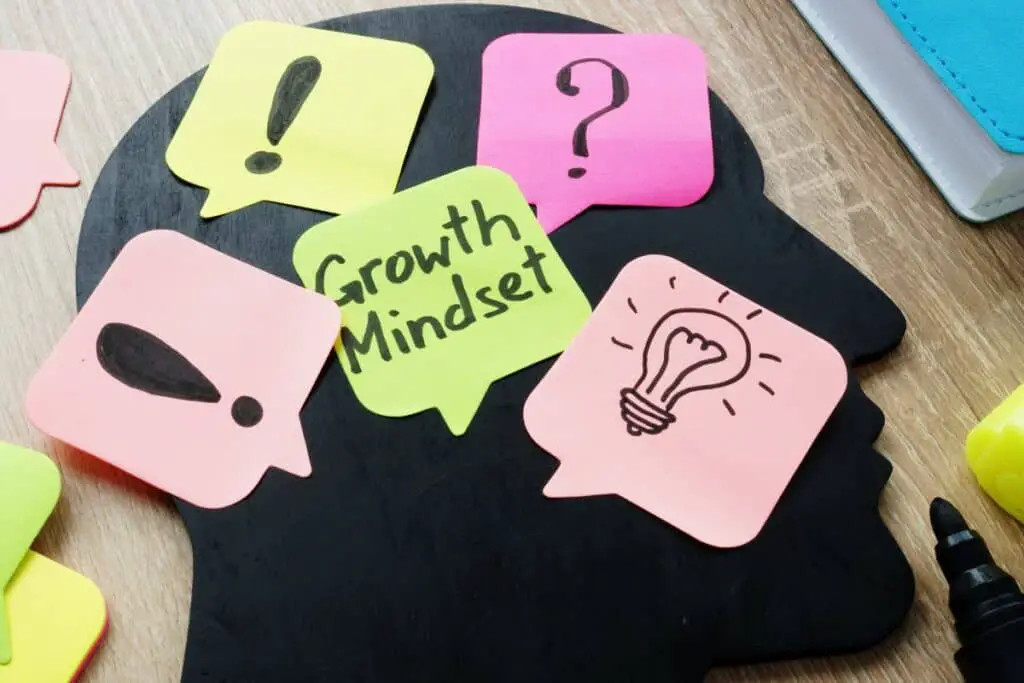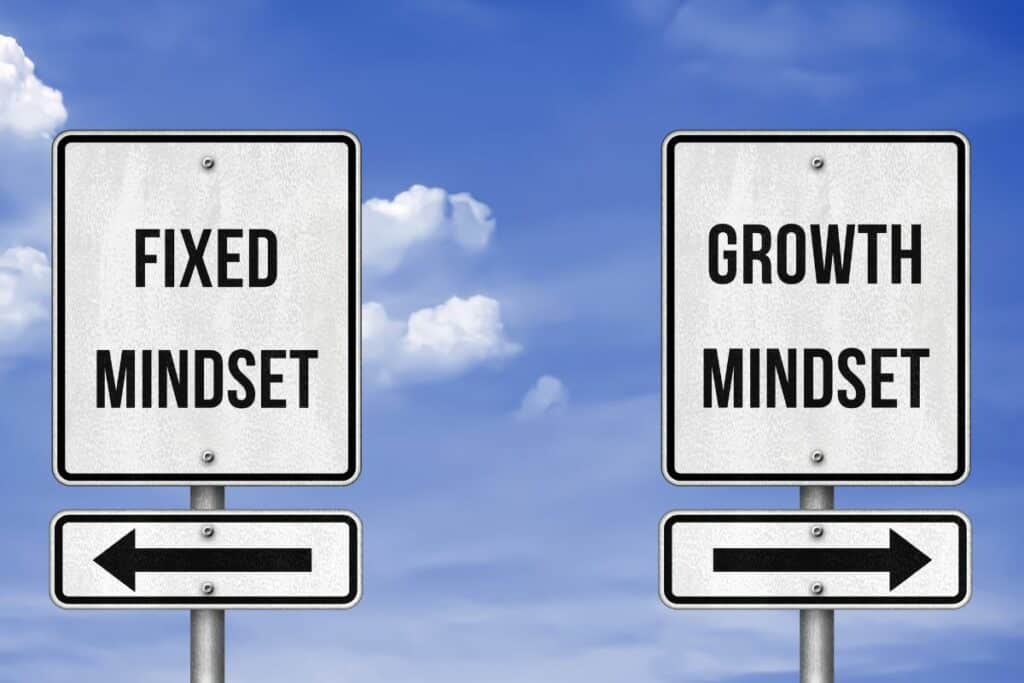Changing your mindset can be tough, but it’s worth it. A growth mindset will help you achieve your goals and reach your full potential.
Are you looking to develop a growth mindset but don’t know where to start?
Having a growth mindset can greatly benefit your life, allowing you to set and achieve goals as well as break down any mental blocks that may stop you from reaching your potential.
According to Buchanan & Creig (2021), mindsets impact human potential in two directions – horizontal development and vertical development. Horizontal development or ‘learning with time’ refers to increasingly adding new skills and knowledge. On the other hand, vertical development is the ‘transformative process’ that allows us to see the world through different lenses.
To develop a growth mindset we must make transformation our responsibility.
(Buchanan & Greig, 2021)
- 1. Define what a growth mindset is and how it differs from a fixed mindset
- 2. Understand the importance of developing a growth mindset
- 3 Focus on progress instead of results
- 4. Accept failure as an opportunity to learn and grow
- 5. Monitor self-talk to develop a growth mindset
- 6. Visualize the future you want to create for yourself
- 7. Learn from successful people who have a growth mindset
- 8. Attempt new challenges to develop a growth mindset
- Are there any disadvantages of developing a growth mindset?
- Why is it important to change my mindset?
- How can I become a better version of myself?
With just one simple shift in how you view the world, it’s possible for anyone to begin cultivating their path to success. This blog post will provide 8 key tips that have been proven to kick-start the growth mindset journey. Let’s get started!
Research shows that mindset is dynamic. However, the influential factors shift with time from being influenced predominantly by authoritative figures during childhood to having a greater reliance on observation and personal experience as we age.
Limeri et al., 2020

1. Define what a growth mindset is and how it differs from a fixed mindset
A growth mindset is the belief that abilities and intelligence can be developed through dedication and hard work. It encourages facing challenges as growth mindset individuals believe they can learn and improve over time. Failure is identified as part of the process.
This is different from a fixed mindset, which is the belief that characteristics such as talent and intelligence are predetermined and cannot be changed no matter the effort applied. Fixed mindset individuals tend to seek validation from others and it may lead to an avoidance of any difficult tasks or activities that could reveal their lack of proficiency.
Academic success is not only influenced by cognitive ability and knowledge; but also by non-cognitive factors including out mindset.
Limeri et al., 2020
2. Understand the importance of developing a growth mindset
Developing a growth mindset is becoming increasingly important to ensure success in our ever-evolving world. Possessing a growth mindset strengthens motivation and establishes a positive outlook for those seeking to develop themselves mentally and professionally.
It offers boundless opportunities for personal development which can further lead to professional advancement or new experiences. Thus, it’s clear that having a growth mindset is essential for those wanting to change their lives or achieve ambitious goals.
According to research, students with a growth mindset were shown to have less “stress due to life events” and lower “mental health issues” when compared to those with a fixed mindset.
TAO ET AL., 2022
Read also: Why is the important to change your mindset
3 Focus on progress instead of results
Focusing on progress instead of results can be a great way to develop a growth mindset. Doing so will help establish a positive outlook and provide motivation when rational analysis may not be enough.
Adopting this as part of your overall strategy will boost morale, creativity, and confidence while tackling difficult tasks without becoming overwhelmed by the magnitude of the goal.
Research shows that praising a young student’s attributes or intelligence can cause a fixed mindset since it leads to the belief that success is innate.
Limeri et al., 2020
Instead, praising their progress stimulates a growth mindset since it focuses on behavior or effort that’s required for success.

4. Accept failure as an opportunity to learn and grow
Accepting failure is a key element for developing successful learning and growth strategies throughout life. Taking ownership of mistakes and missteps provides an invaluable asset for navigating challenging situations and advancing oneself.
By reframing the way we think about failure and learning from the experience, we gain resilience, deepen our understanding of how to approach similar situations, understand our limitations better, and develop the insights required to reach our goals.
A growth mindset suggests that our ability/intelligence is acquired through effort. Therefore, our intelligence is not static and thus, failure is seen as an opportunity for improvement.
puri et al., 2022
5. Monitor self-talk to develop a growth mindset
A key element for developing a growth mindset is monitoring self-talk, and being kind and compassionate to yourself.
Self-talk can influence our feelings and behavior in ways that either promote or impede growth, so it’s important to recognize when your inner voice is sending out negative messages and counter them with targeted coping strategies.
Start by identifying the specific cause of each negative thought – this will give you more insight into how best to address it.
Additionally, practice self-affirmation and positive thinking; recognizing that negative thoughts are not facts, and focusing instead on reminding yourself of your existing strengths. Developing healthy outlets for stress, like exercise or mindfulness activities, are also important to combating negative thoughts.
Additionally, reach out to family or friends who can provide positive reinforcement and offer helpful support in turning a negative thought into a more productive one.
Monitor how well you are practicing this each day and look out for opportunities to boost your self-esteem. Doing so will expand your perspective for progress and success.
A study to assess the effectiveness of self-talk on basketball performance showed that self-talk has a positive effect on performance when the content is aligned to the task being performed.
theodorakis et al., 2001
Read also: 9 Simple Steps To Be A Better You
6. Visualize the future you want to create for yourself
Visualizing the future you want to create for yourself is a powerful tool to develop a growth mindset. Visualization encourages positive thinking and goal-setting, providing motivation and accountability for making progress along the way.
It also serves as tangible evidence of our ideas, dreams, and desires and provides evidence for actively pursuing growth opportunities beyond our comfort zone. Visualizing change can inspire us to keep growing and striving for success, ultimately leading us in the direction of our goals.
Have a vision of where you want to be, then create a bigger version of yourself.
Jain & Apple (2015)

7. Learn from successful people who have a growth mindset
Learning from successful people who have a growth mindset can help you develop a growth mindset of your own. It’s important to ask questions and seek advice from others as they can be great sources of inspiration and knowledge.
Hearing stories about the experiences of successful people in various fields can also be helpful for developing an understanding of how a growth mindset cuts across different kinds of work, industries, or sectors. Taking an active approach to learning from successful people with a growth mindset can be one way to gain insight into having this type of habitual thinking yourself.
Mindset interventions that focus on the social element; encouraging peers to share how they overcome struggles through effort, change and seeking help can inspire others to believe that they too can overcome their own challenges.
limeri et al., 2020
8. Attempt new challenges to develop a growth mindset
By challenging yourself outside of your comfort zone, you can gain the confidence to achieve even more cognitively and emotionally. It could be something as small as trying a new recipe, or as ambitious as taking up a new language.
No matter what it is, when we actively push ourselves to take part in unfamiliar activities, we’re sending ourselves the message that success and failure are both possibilities.
With an open mind, growth opportunities will appear every day, encouraging us to move beyond our existing boundaries and helping us constructively tackle future decisions. Attempting challenges is vital for cultivating resilience, so don’t be afraid to put yourself out there.
Research shows that both low and high achievers benefited from promoting challenge seeking and effort.
dweck et al., 2019
Are there any disadvantages of developing a growth mindset?
Unfortunately, there are some disadvantages of a growth mindset. It is important to take time in between growth spurts and practice self-care, as focusing too much on growth can lead to burnout.
Additionally, an understanding of the difference between manageable challenges and tasks that are out of your reach are imperative. Achieving a growth mindset means learning how to recognize when something might be beyond your abilities or when you simply need more practice.
It is also important to be aware of the potential for failure that comes with taking on new challenges and to be prepared to accept these setbacks in order to continue growing.
Finally, it is essential to remember that everyone’s journey towards a growth mindset will look different; progress may not happen as quickly or easily for everyone. Keeping this in mind is key to staying motivated and continuing on the path towards personal growth.
Final words on tips to develop a growth mindset
Having a growth mindset can be incredibly rewarding and beneficial for personal development and success. With dedication and commitment, anyone can nurture a growth mindset by visualizing the future, learning from successful people who embody this type of thinking, and developing coping strategies for dealing with negative thoughts.
The advantages of a growth mindset can make it easier to take on challenges and create opportunities for growth, while recognizing that setbacks are an unavoidable part of progress. With the right approach and attitude, anyone can unlock their full potential and get closer to their goals.
Related topics
Why is it important to change my mindset?
It is critical to understand why it is important to change your mindset. When we think about our mindsets, we tend to look at things from a limited perspective; with the same exact thoughts and beliefs that we have held on to for years.
However, by changing our mindset, we can gain a much more holistic view of the world around us, allowing us to not only be more understanding and open-minded but also recognize potential pathways leading to growth and success. Read more
How can I become a better version of myself?
Do you always feel like there’s something more to strive for? Have you ever felt frustrated while attempting new goals or changes in your life, only to fall short of getting where you were aiming?
If this is the case, then learning how to be a better version of yourself may just be the right move for you. In this post, I explore different ways that anyone can work towards their own betterment and aim towards achieving personal satisfaction. Though it can seem daunting at first glance, with determination and dedication it is possible to steadily build upon areas of improvement; let’s learn more about how! Read more
References
Buchanan, A., Greig, J. (2021). Shifting Mindsets: Transforming Self, School, and Society. In: Kern, M.L., Wehmeyer, M.L. (eds) The Palgrave Handbook of Positive Education . Palgrave Macmillan, Cham. https://doi.org/10.1007/978-3-030-64537-3_20
Dweck, C. S. (2019). The Choice to Make a Difference. Perspectives on Psychological Science, 14(1), 21–25.
Limeri, L.B., Carter, N.T., Choe, J. et al. Growing a growth mindset: characterizing how and why undergraduate students’ mindsets change. IJ STEM Ed 7, 35 (2020).
Puri A, Memari M, Sottile EM, Snydman LK, Lee WW, Bonnema RA, Jones D, Nandiwada DR. Changing the Assessment Paradigm: Promoting a Growth Mindset Across the Medical Education Continuum. Am J Med. 2022 Oct 29:S0002-9343(22)00790-2.
Theodorakis, Y., Chroni, S., Laparidis, K., Bebetsos, V., & Douma, I. (2001). Self-Talk in a Basketball-Shooting Task. Perceptual and Motor Skills, 92(1), 309–315.








